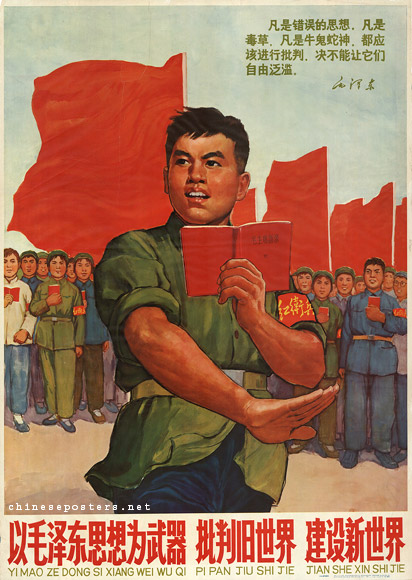
From Campus Clashes to Viral Victories: How Charlie Kirk’s Debate Tactics Echo Mao’s Cultural Revolution
Echoes of Revolution in Viral Debates: Unpacking Charlie Kirk's Campus Conquest
Editor’s Note: This article was originally submitted to us in March 2025 but was not published at the time because it was incomplete. In light of the recent assassination of Charlie Kirk, we have decided to release this piece now, as it offers timely and thought-provoking context.
In the charged arenas of American universities, where ideas clash amid the hum of youthful ambition, Charlie Kirk has carved out a formidable presence. As the founder of Turning Point USA, Kirk's rapid-fire debates and viral clips have captivated millions, positioning him as a conservative powerhouse among young audiences. Yet, beneath the spectacle lies a tapestry of tactical maneuvering, edited narratives, and historical resonances that evoke the fervor of China's Cultural Revolution. Recent events, including an assassination that has intensified political tensions, have amplified this dynamic, raising questions about the true nature of influence in a polarized era.
This phenomenon unfolds against a backdrop of shifting youth politics. National surveys indicate that while conservative voices like Kirk command significant visibility—with over 900 college chapters under Turning Point USA—the broader landscape shows college graduates largely leaning away from GOP alignments. This tension underscores a broader debate: Is Kirk's success a triumph of substance or a masterclass in performative persuasion?
The Illusion of Unassailable Arguments
Kirk's ascent began modestly; he briefly attended Harper College before departing to launch Turning Point USA, building a media empire that includes a top-ranked podcast and extensive campus outreach. Without formal academic credentials, he has nonetheless amassed outsized reach, leveraging live Q&A sessions at elite institutions like Cambridge and Oxford to generate buzz.
Observers note how these encounters often prioritize flair over facts. Fact-checkers, such as those from PolitiFact, have cataloged numerous claims by Kirk as "Mostly False" or "False," highlighting a pattern where assertions lack robust data support. In debates, tactics like swift topic shifts and accusations of interruption allow time to regroup, drawing from established communication strategies documented in scholarly work on political discourse.
Psychological insights further illuminate this approach. Research on processing fluency reveals that articulate, rapid delivery can imbue speakers with an aura of competence, even when claims falter under scrutiny. The illusory truth effect compounds this, as repeated statements gain perceived validity. Some experts suggest that such methods create a compelling veneer, masking underlying weaknesses.
Compounding this is the role of curation. Viral clips, optimized for platforms like X and TikTok, excise awkward pauses and stumbles, crafting an image of dominance. Pew Research in 2024-2025 underscores how short-form videos dominate political consumption, enabling creators to shape narratives through selective editing. In structured settings, like the Cambridge Union, Kirk's positions face heavier contestation, yet highlight reels often portray unyielding victories.
This model thrives in adversarial campus environments, where rational but socially inexperienced students provide fertile ground for confrontational exchanges. While Kirk's influence is tangible—evidenced by hundreds of chapters—it falls short of hegemony, given that only a fraction of the 3,500 U.S. degree-granting institutions and 15-16 million undergrads align with his views.
Shadows of a Turbulent Past in Modern Mobilization
Delving deeper, Kirk's strategies bear striking structural parallels to the youth-driven upheavals of China's Cultural Revolution in the 1960s. During that era, Red Guards—predominantly students—mobilized against perceived ideological foes, using tools like big-character posters to publicly denounce authorities. These posters served as persistent accusation boards, fostering a culture of naming and shaming.
In a contemporary echo, Turning Point USA's Professor Watchlist compiles names of faculty deemed adversarial, drawing criticism from free-speech advocates for its potential to stifle discourse. Though lacking the state coercion of Mao's time, this list functions as a digital equivalent, leveraging shareable content to index opponents and rally supporters.
The performative essence aligns closely too. Cultural Revolution "struggle sessions" emphasized ritualized confrontations, where volume and loyalty signaling trumped evidence. Similarly, Kirk's open-mic debates reward spectacle—fast-paced delivery, interruptions, and binary framing of exchanges as triumphs or defeats. Psychological studies affirm how fluency and repetition enhance persuasion in these formats, mirroring the era's rhetorical heuristics.
Patronage networks offer another layer. The Gang of Four rose through alignment with Mao, controlling propaganda to enforce boundaries. Kirk's trajectory, bolstered by proximity to Trump and a self-sustaining media ecosystem, mirrors this in form: loyalty branding and channel dominance amplify reach within conservative circles.
Campuses as stages complete the resonance. Beijing universities ignited the Cultural Revolution through rallies and purges; today, U.S. campuses serve as performative battlegrounds for ideological showdowns. Yet, caveats abound—the absence of state violence and mass coercion distinguishes the contexts profoundly. Modern influence stems from decentralized platforms and donor networks, not centralized orchestration, operating within democratic pluralism.
Some analysts argue these echoes highlight rhetorical incentives rather than moral equivalence, emphasizing how denunciation lists and viral spectacles persist as mobilization tools across eras.
Acceleration Amid Crisis: From Clips to Broader Ripples
The epiphany emerges: Kirk's "debate miracles" hinge on attention arbitrage—transforming raw confrontations into polished clips, fostering community, and converting it into political and financial capital. This flywheel, already potent, has gained momentum following the assassination, heightening polarization and engagement.
Broader implications ripple outward. In an era where viral content shapes perceptions, such dynamics risk entrenching divisions, sidelining nuanced discourse. Data reveals persistent ideological gaps among college graduates, suggesting visibility does not equate to wholesale conversion. As platforms evolve, the interplay of editing and algorithms could further distort public understanding.